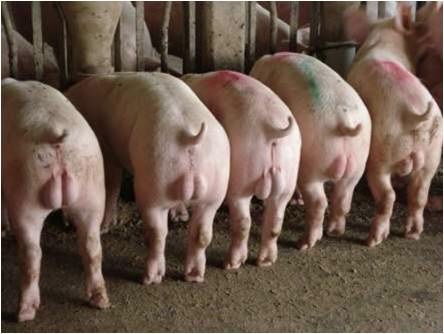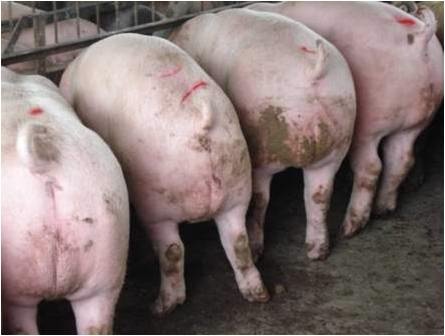
The launch of the first vaccine to reduce boar taint in the UK and Ireland heralds a new era in pig production with farmers set to benefit from improved production performance, welfare and meat quality.
In addition, EU approval for the vaccine Improvac® from Pfizer Animal Health will enable producers to rear pigs to a heavier weight, taking advantage of the faster growth in the later finishing period, without risk of boar taint in the meat.
The enhanced meat quality — confirmed by UK taste panels — provides the potential for inclusion in premium food ranges and for increased use of boar meat by traditional family butchers.
Boar taint is associated with an unpleasant odour or taste in cooked pork to which three out of four consumers are sensitive. The taint is caused by two compounds that accumulate in the fat as male pigs become sexually mature — androstenone produced by the testicles and skatole, a by-product of bacterial activity in the gut.

Traditionally, pork producers have used castration of male piglets as the main means of control, but this was phased out in the UK and Ireland during the 1980s on animal welfare grounds — although it is still widely practised across Europe. Instead, UK and Irish producers have slaughtered male pigs younger — normally weighing 100 to 105 kg liveweight — to reduce the risk of boar taint.
Improvac is a vaccine that stimulates the pig’s own immune system to block production of the boar taint compounds. The antigen in the vaccine is a carrier protein linked to a synthetic molecule similar to the naturally occurring Gonadotrophin Releasing Factor (GnRF), which controls the development and function of the testes in male pigs. The vaccine causes the immune system to produce antibodies to GnRF.
The first dose primes the immune system and the second dose a few weeks later causes a surge in production of the antibodies which inhibit the development of the testes. This prevents production of androstenone and as a result skatole is also reduced because the lower steroid levels allow the liver to metabolize skatole more efficiently. Tissue concentrations of androstenone and skatole decline to negligible levels four to six weeks after the second vaccination, so this is the time for slaughter.
"Early slaughtering means that producers cannot reap the benefits of the growing pigs to heavier weights and thus reducing farm overheads. In addition, pork quality can suffer," says veterinarian Nigel Lodge, technical manager for Pfizer’s pig division.
UK trials have shown significant increases in average daily weight gain from the second Improvac vaccination to slaughter — up by 138 grams from 1115 to 1253 grams — reducing the time to reach the target slaughter weight.
Another practical advantage for producers is that vaccinated boars do not show the characteristic testosterone-associated mounting and aggression often seen in entire male pigs in the late fattening period. They become much easier to manage with less risk of late lameness, mortality and skin lesions. Gilt pregnancy in mixed pens is also reduced.
In addition to the on-farm benefits, producers stand to gain from the superior meat quality of their male pigs. Taste panel verdicts show a clear preference for pork from Improvac vaccinated pigs over entire males. "This provides real opportunities for retailers seeking to extend their premium ranges," says Mr Lodge.
One study at the University of Bristol involved 450 entire male pigs slaughtered at 20 weeks (105 kg liveweight). A trained taste panel at the university compared steaks cooked for three minutes to 72.5°C. The results showed significantly higher positive pork odour and meat flavour intensity in the vaccinated pigs, with less abnormal fat odour and less abnormal meat flavour. The conclusion was a higher hedonic preference for the pork from Improvac vaccinated pigs.
"The preference for the meat from the vaccinated pigs was highly significant," says Mr Lodge. "This was explained by the absence of boar taint. This is consistent with what has been found in countries such as Switzerland that have recently started using vaccination as an alternative to castration of pigs, leading to improved quality without having to rely on processing at a younger age to reduce the risk of boar taint."
Since castration was phased out in the UK and Eire, many family butchers have long adopted a policy of selling only pork from female pigs.
"Family butchers build their reputation based on quality and reliability — they wouldn’t want to risk their pork being associated with boar taint," says Mr Lodge. "Buying meat from Improvac vaccinated boars removes this risk, which will be a major bonus for producers supplying local butchers who will now have a ready market for all of their pigs."
CAPTION FOR PICTURES
The impact of Improvac in inhibiting testis development, as shown in these pictures, taken at time of second vaccination and two weeks later.
